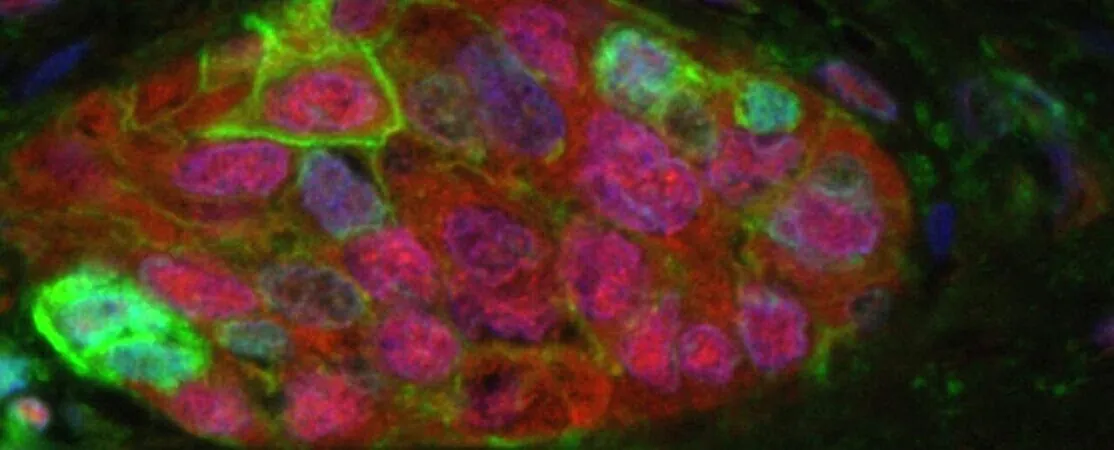
Revolutionary Breakthrough: Scientists Use Immunotherapy to Banished Aging Cells and Boost Your Immune System!
2024-12-23
Author: Wei Ling
Introduction
Aging is often likened to a sink overflowing due to a blockage—over the years, our bodies accumulate senescent cells that cease to divide but stubbornly refuse to die. These ‘zombie’ cells, as they are sometimes called, linger in our tissues, causing inflammation and potentially leading to age-related diseases. Recent research suggests that eliminating these cells could slow down aging, reduce inflammation, and even extend life. But until now, scientists lacked a drug that could efficiently target these troublesome cells.
Groundbreaking Discovery
Enter researchers from the Weizmann Institute of Science, who have made a remarkable discovery that could change everything. According to their study published in *Nature Cell Biology*, these senescent cells inhibit the immune system’s ability to clear them out, creating a biological logjam. The Weizmann Institute's Prof. Valery Krizhanovsky, a leader in studies on aging and inflammation, alongside Dr. Julia Majewska and Dr. Amit Agrawal, has identified a groundbreaking immunotherapy approach to rescue your body’s defense system.
Role of PD-L1 in Aging
By experimenting with mice, the scientists found that senescent cells in the lungs produce an overabundance of PD-L1, a protein typically manipulated by cancer cells to evade immune attack. While PD-L1's role in cancer therapy is well-established, its function in aging has remained relatively unexplored—until now.
Connecting PD-L1 and p16
This research reveals that the increase in PD-L1 is linked to p16, a protein that serves as a brake on cell division. As cells age, p16 rises, preventing the breakdown of PD-L1, allowing these compromised cells to evade immune detection.
Implications for Aging and Disease
But the journey doesn’t stop here. The implications of this discovery reach beyond mere aging. The Weizmann team found elevated levels of PD-L1 not just in aging mice, but also in models of chronic obstructive pulmonary disease (COPD), prevalent in smokers. Humans with COPD also exhibited these same senescent cells overflowing with PD-L1.
Immunotherapy Approach
Harnessing this knowledge, the researchers sought to use an existing cancer treatment antibody to home in on PD-L1. The antibody successfully mobilized T cells and other immune responses in aged mice, leading to a notable reduction in senescent cell populations.
Conclusion and Future Prospects
Prof. Krizhanovsky explains, "Our treatment didn’t stop the aging clock entirely, but it was effective in clearing out senescent cells and reducing inflammation-associated proteins." This groundbreaking work opens a new frontier in aging research. Could this mean a future where aging is not just a number, but a manageable condition? The possibility that we can reawaken our immune systems to combat these cellular invaders is thrilling and could redefine what it means to grow old.
Stay tuned: future studies could put us one step closer to a revolutionary drug that harnesses the power of immunotherapy to not just slow down aging, but to beat it!



 Brasil (PT)
Brasil (PT)
 Canada (EN)
Canada (EN)
 Chile (ES)
Chile (ES)
 Česko (CS)
Česko (CS)
 대한민국 (KO)
대한민국 (KO)
 España (ES)
España (ES)
 France (FR)
France (FR)
 Hong Kong (EN)
Hong Kong (EN)
 Italia (IT)
Italia (IT)
 日本 (JA)
日本 (JA)
 Magyarország (HU)
Magyarország (HU)
 Norge (NO)
Norge (NO)
 Polska (PL)
Polska (PL)
 Schweiz (DE)
Schweiz (DE)
 Singapore (EN)
Singapore (EN)
 Sverige (SV)
Sverige (SV)
 Suomi (FI)
Suomi (FI)
 Türkiye (TR)
Türkiye (TR)
 الإمارات العربية المتحدة (AR)
الإمارات العربية المتحدة (AR)